20 Dec 2018 | Africa, Awards, Fellowship, Fellowship 2018, News and features, Sub-Saharan Africa
[vc_row][vc_column][vc_column_text]
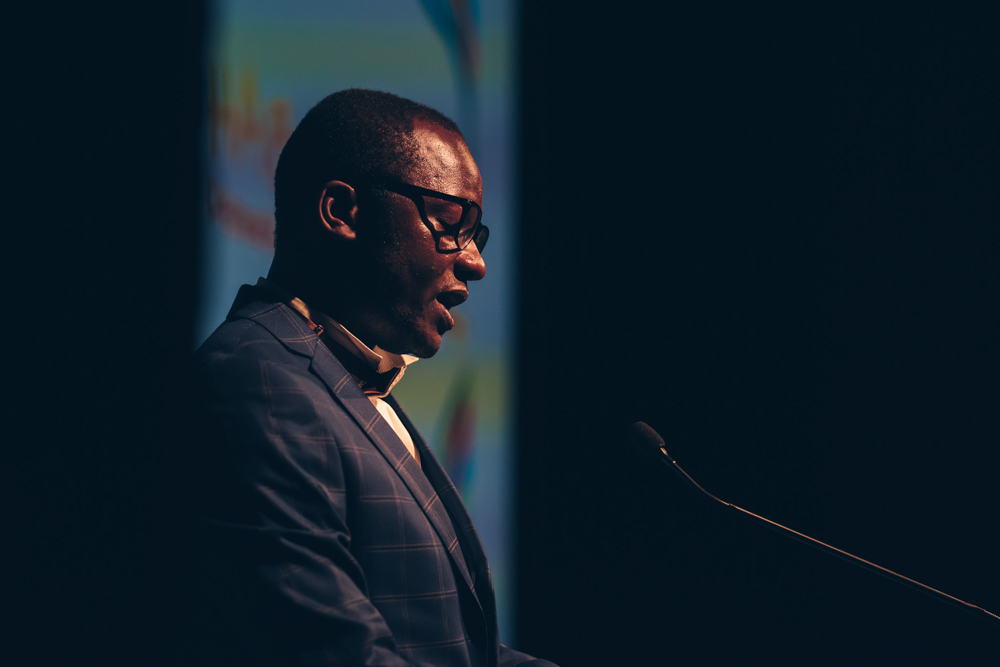
Guy Muyembe of the Digital Activism Award-winning Habari RDC at the 2018 Index on Censorship Freedom of Expression Awards (Photo: Elina Kansikas for Index on Censorship)
The Democratic Republic of Congo will go to the polls on 23 December to elect a successor to incumbent president Joseph Kabila, who has been in power since January 2001 when he inherited the position from his assassinated father. The election was originally scheduled for 27 November 2016, a delay that has caused many problems for the country.
“The only thing that is certain about the election is the uncertainty that comes with it,” Guy Muyembe, president of Habari RDC, the Index on Censorship Freedom of Expression Award Fellow for Digital Activism, tells Index. “Will it take place, will it not take place? How transparent will it be? In all likelihood, not very. And will the result tear the country apart?”
Launched in 2016, Habari RDC is a collective of more than 100 young Congolese bloggers and web activists who give voice to the opinions of young people from all over the Democratic Republic of Congo. In recent months, they have been working towards covering what could be the first democratic transfer of power in the country’s history.
“But in the end, it will most likely be the same people in power,” Muyembe says. “As for Kabila himself, if he remains in the country, he might be operating from the shadows. This is definitely not a reassuring prospect.”
This is a tense time for the DRC. The UN high commissioner for human rights Michelle Bachelet has expressed concern at violence against opposition rallies around the country in the run-up to the election. Bachelet called on the authorities to ensure “the rights to freedom of expression and peaceful assembly – essential conditions for credible elections – are fully protected”. Muyembe is also concerned about what all this means for those running in opposition to the ruling People’s Party for Reconstruction and Democracy: “They’re taking part in the campaign, but will they actually take part in the election in the end?”
During this period the risk factor for activists has been very high, Muyembe says. “They’re not protected legally, and it’s very easy to label them spies or start a crackdown against them.” The prospects for a free press in the country don’t look any better. Peter Tiani, a journalist for Le Vrai Journal, was arrested in November and faces a one-year jail term on defamation charges for reporting that a large sum of money was stolen from the home of Bruno Tshibala, the country’s prime minister. Tiani became a target because he reported on the second most powerful man in the DRC, Muyembe says.
“Even journalists who don’t explicitly view the government in a favourable way — those who aren’t necessarily negative but are neutral, as many are — are presented unfavourably by state media,” Muyembe explains. For those who are explicitly critical, he says, the situation can get even worse. With this in mind, Habari has put together some helpful advice for bloggers and citizen journalists.
Online freedoms too remain under strain in the absence of clear laws on the internet, Muyembe says. “While we do want to see such a law, we are also nervous because it could go in a very bad direction and is open to abuse.” As Habari has reported, the hacking of websites ahead of the election has facilitated both censorship and fake news.
Young Congolese people were at the forefront of calls for Kabila not to seek re-election, and Muyembe and his colleagues are keen to ensure that the voices of the country’s youth continue to be heard. Habari took part in Speak, a worldwide campaign organised by the NGO Civicus, in November, which sought to raise awareness and build global solidarity in an era when people around the world are facing increased attacks on their basic freedoms. Habari hosted the Gala of Peace, a meeting between young supporters of different political parties and members of citizen movements, that included theatre and dance as well as discussion.
“This year, the idea was to try to work on uniting people who’ve been divided, whether it’s on the social level or the political level,” Muyembe says. “This has much relevance in the DRC, for the divisions that exist between those people who are pro and anti-regime, between the old and young, between men and women and those of different tribes.”
The DRC is also right now in the middle of one of the worst Ebola outbreaks in its history, exacerbated by the ongoing unrest, making it impossible to transport adequate medical care to those in need. “This crisis is different this time around because it’s happening in a part of the country which has been severely affected by the war — the Kivu province in the east of the country,” Muyembe says. “Because of the war, there is a mass migration of the population there whenever there is an attack, which could turn into a major Ebola crisis as there’s a lot of people moving around.”
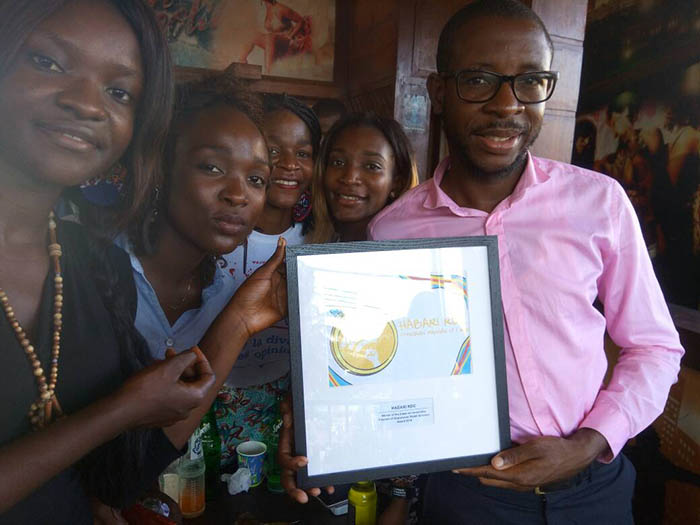
Next year will be a busy one for Habari in continuing to cover all of these issues. Going forward, the organisation’s biggest challenge, Muyembe says, is ensuring the project has a future as Habari’s partnership with RNW Media, a Dutch organisation that helps young people make social change, along with the essential funding from this relationship, ends in 2020.
However, becoming an Index on Censorship Fellow offers much hope, Muyembe says. “The award has increased how well-known the project is, and how serious it appears. If we now go to meet someone in Kinshasa to talk about the project, or go to an embassy to try to organise something, we are better received.”
For Habari, the training provided by Index, such as the virtual sessions on reporting on elections, has also been invaluable, Muyembe adds. The next training session, by Protection International in January, will focus on developing security and protection management strategies.
Muyembe says that people are often suspicious of organisations involving young people, but the Index award has made things a little easier in this regard. “Every day, colleagues have been telling me that they need to have a copy of the prize that they receive on their website,” he says. “It’s like a business card.”
[/vc_column_text][/vc_column][/vc_row][vc_row][vc_column][vc_basic_grid post_type=”post” max_items=”4″ element_width=”6″ grid_id=”vc_gid:1545229521275-5925950b-9a87-2″ taxonomies=”16143″][/vc_column][/vc_row]
19 Dec 2018 | Americas, Awards, Fellowship, Fellowship 2018, Honduras, News and features
[vc_row][vc_column][vc_column_text]
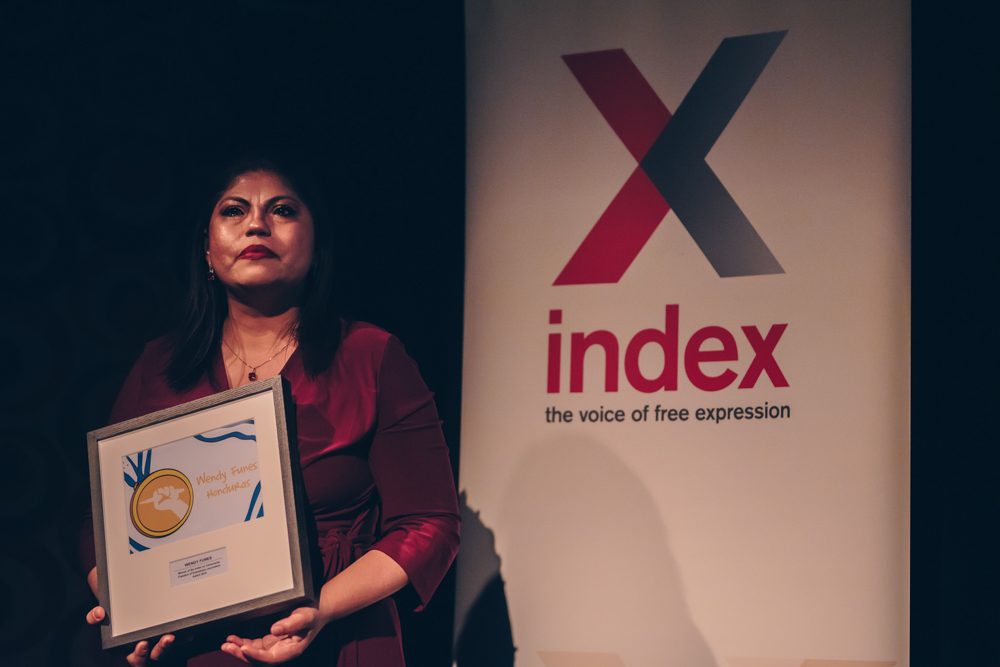
2018 Freedom of Expression Journalism Award-winner and 2018 Journalism Fellow Honduran investigative journalist Wendy Funes at the 2018 Index on Censorship Freedom of Expression Awards (Photo: Elina Kansikas)
“Violence is a way of keeping society under control because a lot of what people do or don’t do is a reaction to fear,” Wendy Funes, winner of the 2018 Index on Censorship Freedom of Expression Awards Fellowship for Journalism, tells Index on Censorship. “It becomes an indirect method of control, not just over society, but journalism as well.”
Funes worries this kind of violence has become “normalised” in Honduras and says the shooting and wounding of journalist Geovanny Sierra — who has survived numerous attempts on his life — by military police while covering protests of electoral fraud in late November is just the latest example. The Honduran authorities issued a statement saying that law enforcement was attacked first, which is why they started shooting. “With this they have justified the crime,” Funes says, adding that nothing is being done about the attacks on journalists in the country: “The most terrible thing is the impunity that exists because if something like this happened in another country it would a scandal, but here it is already forgotten.”
Funes is no stranger to covering either corruption or protest and has had her own brushes with heavy-handed state forces, although she says for the most part she has been lucky. “I’ve had training opportunities in self-protection and security,” she says. “I am also very cautious — I try to plan my routes and if I go inter dangerous areas, I try to have a safety protocol, to have alliances with civil society groups, so if something happens to me I can let them know.”
Recently, Funes’ investigative website Reporteros de Investigacion has been focusing on issues such as human trafficking, violence against student protesters, femicide and the high-level cocaine trafficking case involving Juan Antonio Hernández, brother of Honduran president Juan Orlando Hernández. The website has also been covering the caravan of people fleeing persecution, poverty and violence in the country. “They are facing a very cruel situation,” Funes says.
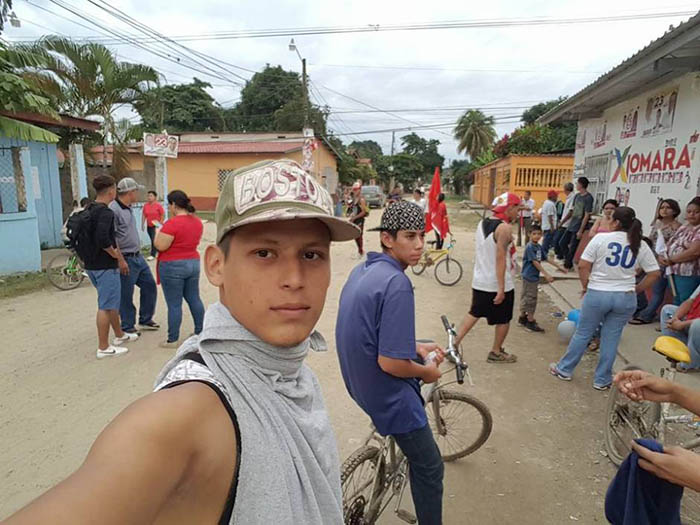
Honduran migrant Daniel Portillo
Although Reporteros de Investigacion doesn’t have the resources to cross the border, it has been working closely with some of those who have fled, such as 25-year-old Daniel Portillo, who left Honduras in search of the “American dream”. Portillo is now in Mexico. “He has found someone who works with migrants and helps migrants,” Funes, who first met him when she was covering protests in San Pedro Sula, a city in the northwest of Honduras, said. “He is a young person with a lot of leadership qualities, a lot of desire to advocate for other young people.”
While in Honduras Portillo organised sports tournaments in an area controlled by the criminal gang MS-13. “He resisted joining the gang,” Funes says. “He was always trying to negotiate with them so that he could help other young people so they wouldn’t get into drugs or alcohol.”
Writing in Reporteros de Investigacion, Portillo explains the difficulty of explaining to his young daughter that he left so she could have a better future: “If God allows it, we will see each other again or else, I am writing this letter to you in case unfortunately they killed me on the way and buried me; my heart is that of a warrior and I will continue forward, whatever happens, my mother suffers for my departure.”
“He told me that he has seen many people carved up since he was a child,” Funes tells Index. “Violence weighed on his psyche and made him very vulnerable young person. He told me that he looked for employment in Honduras, and when he could not find he decided to migrate with the caravan.”
It is such vulnerability that makes poor Hondurans so susceptible to human trafficking. “It’s like Russian roulette,” Funes says. “I have come to realise that there are many Hondurans who have an eagerness to migrate to the USA, but have ended up staying in countries like El Salvador, Guatemala, Mexico and Belize and have become victims of sexual exploitation, domestic service and forced matrimonies as they flee from gangs and narco-politics. Some of the people who have left come back mutilated because they lose limbs on the trains.”
For those that do make it to the USA, they face discrimination, but at least they have the opportunity for better salaries, with which they can send money to their families struggling back home, Funes says. These remittances play a key role in sustaining the Honduran economy. In May 2018 Hondurans abroad sent back an all-time high of $456.2 million in a single month.
While Funes would like to see more Hondurans stay at home, not only to avoid the very real risks that come with being a migrant, but also to fight for real change, she is all too aware of why people choose instead to leave. “You have to work five times harder than a corrupt individual to be able to sustain yourself and get ahead in Honduras. This economic model displaces the most vulnerable individuals.”
Much of what Funes and her team do over the next year will be geared towards her dream of founding a centre of investigative journalism, including training journalists and students with the help of Factum magazine in El Salvador. “This will bring together many different journalists who want to transform Honduras with investigative journalism,” Funes says.
With a grant from the National Endowment for Democracy, Funes and her team will also work on a project called Sembrando el Periodismo de Investigación en Honduras (Sowing Investigative Journalism In Honduras), which will involve four major investigations over the course of 2019.
“Many of the things that I dreamt of happening one day, in an idealistic way, have become reality, all thanks to Index,” Funes adds. “Solidarity, love and friendship are really the things that can move this world, and that is what Index is made of with all of the support they have extended to me.”
[/vc_column_text][/vc_column][/vc_row][vc_row][vc_column][vc_basic_grid post_type=”post” max_items=”4″ element_width=”6″ grid_id=”vc_gid:1561460137741-61f82764-3b8a-4″ taxonomies=”23255″][/vc_column][/vc_row]
18 Dec 2018 | Campaigns -- Featured, Statements
[vc_row][vc_column][vc_column_text]
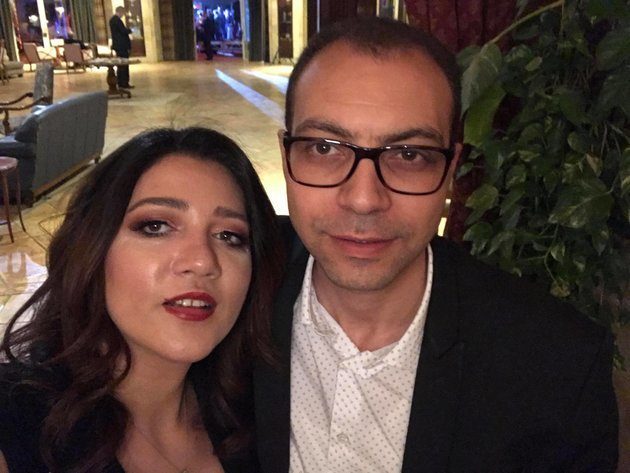
Mohamed Lotfy (right) with his wife, the imprisoned activist Amal Fathy
A Cairo criminal court has ordered that Egyptian activist Amal Fathy, who was arrested on 11 May after posting a video criticising sexual harassment in Egypt, be released.
Rachael Jolley, editor of Index on Censorship magazine, said: “No one should face arbitrary detention for freely expressing their opinions, in this case about how she felt about being sexually harassed. These charges have never made sense. While we welcome the order to release Amal, she must now actually be freed and all charges against her dropped.”
Fathy stood accused of “belonging to a terrorist group”, “using a website to promote ideas calling for terrorist acts”, and “intentionally disseminating false news that could harm public security and interest”.
During her appeal session on 25 November, Fathy told the judge: “I am afraid to go out to streets alone, every time I walk in the street alone someone harasses me. Last time, my son was going to be kidnapped from my arms by a motorcycle rider in Mohandiseen area. I am afraid to get out of my house, but I had to get out that day.”
Fathy took a taxi to the bank and was sexually assaulted by the driver. A crowd gathered, but let the man go. “I was in a shock and tried to understand what just has happened,” she told the judge.
A police officer showed up at the scene. “I looked at him, he was opening his trousers’ zipper and saying to me come here and I will make you feel comfortable. I experienced another shock and started to shout and scream,” Fathy said. “I felt powerless and subjugated and that’s what I said in the video. I never felt safe as a woman in my country, and this is not the first time that this happens to me.”
Fathy’s husband Mohamed Lotfy said of the ruling: “I am delighted to inform you that today a Cairo Criminal court has accepted Amal Fathy’s appeal against her preventive detention and ordered her release on probation (in case 621 of 2018 state security prosecution). She should be released within the next few days and check in a couple of times every week at a police station. On 26 December she will appear in front of another Cairo Criminal court to (most probably) extend her period of probation in the same case. On 30 December, the Maadi Appeals Misdemeanor court will issue its verdict in the other case (case 7991 of 2018 Maadi Misdemeanors). Maadi Misdemeanor court gave her a 2 years prison sentence and a fine and bail to suspend the sentence until the appeals court issues its verdict. The bail and fine were paid and we are now awaiting the final verdict by the appeals court on 30 December.”
Doughty Street Chambers — along with ECRF and Index on Censorship — have worked together on this case by lodging complaints with the United Nations Special Rapporteurs on freedom of expression and the protection of human rights defenders. Additionally, they had an ongoing appeal against Egypt with the UN Working Group on Arbitrary Detention, which was being considered.[/vc_column_text][vc_basic_grid post_type=”post” max_items=”4″ element_width=”6″ grid_id=”vc_gid:1545208658227-39c5d90f-2d7b-3″ taxonomies=”25926″][/vc_column][/vc_row]
18 Dec 2018 | Bahrain, Bahrain Statements, Campaigns, Campaigns -- Featured
[vc_row][vc_column][vc_single_image image=”80241″ img_size=”full” add_caption=”yes”][vc_column_text]We the undersigned call on Bahraini authorities to release Nabeel Rajab immediately, to repeal his convictions and sentences, and drop all charges against him. On 31 December 2018 the Court of Cassation in Bahrain may issue its verdict in the appeal of the five-year prison sentence handed to him for peaceful comments posted and retweeted on his Twitter account about the killing of civilians in the Yemen conflict by the Saudi Arabia-led coalition, and allegations of torture in Jau prison.
We are concerned that the authorities intend to increase Rajab’s prison sentence unopposed, by setting 31 December as the date for a hearing and possible issuing of a verdict, while most Bahrainis and people around the globe will be focused on year-end celebrations. This is not an idle concern, as, opposition leader Sheikh Ali Salman was arrested on 28 December 2014 and subsequently convicted and sentenced to four years in jail following an unfair trial. And last month, in yet another case brought against him on spying charges, the Court of Appeal overturned his initial acquittal and sentenced him instead to life in prison.
Rajab has been a tireless champion of human rights for many years, helping to found and run the Bahrain Center for Human Rights and the Gulf Centre for Human Rights, both members of the IFEX network.
He has been detained since his arrest on 13 June 2016. He was held largely in solitary confinement during the first nine months of his detention, violating UN rules on pre-trial imprisonment, and has been subjected to humiliating treatment. His books, toiletries, and clothes have been confiscated and his cell frequently raided at night.
Rajab was sentenced to two years in jail in 2017 on charges of “publishing and broadcasting false news that undermines the prestige of the state” during TV interviews he gave in 2015 and 2016 in which he stated that Bahraini authorities bar reporters and human rights workers from entering the country. He was sentenced in 2018 to five years in prison on charges of “disseminating false rumors in times of war” for tweets about torture in Jau Prison and the war in Yemen.
At its eighty-first session, 17-26 April 2018, the Working Group on Arbitrary Detention concluded that Rajab’s “deprivation of liberty constitutes a violation of articles 2 and 7 of the Universal Declaration of Human Rights and articles 2 (1) and 26 of the Covenant – on the grounds of discrimination based on political or other opinion, as well as on his status as a human rights defender”.
We therefore urge Bahraini authorities to immediately and unconditionally release Nabeel Rajab, quash his convictions and sentences, and drop all charges against him; and undertake a prompt, impartial, independent and effective investigation into his allegations of ill-treatment. The findings of the investigation must be made public and anyone suspected of criminal responsibility must be brought to justice in fair proceedings.
As this case is part of a pattern of abuse and harassment against human rights defenders and journalists in Bahrain, we also urge the authorities to cease all such actions and ensure that the right to freedom of expression and freedom of the press is respected.
Signed,
Bahrain Center for Human Rights
ActiveWatch – Media Monitoring Agency
Adil Soz – International Foundation for Protection of Freedom of Speech
Africa Freedom of Information Centre (AFIC)
Americans for Democracy & Human Rights in Bahrain (ADHRB)
Arabic Network for Human Rights Information (ANHRI)
Association for Freedom of Thought and Expression (AFTE)
Association of Caribbean Media Workers
Bytes for All (B4A)
Cairo Institute for Human Rights Studies (CIHRS)
Cambodian Center for Human Rights (CCHR)
Electronic Frontier Foundation (EFF)
Foro de Periodismo Argentino
Freedom Forum
Free Media Movement
Globe International Center
Gulf Centre for Human Rights (GCHR)
Human Rights Watch (HRW)
I’lam Arab Center for Media Freedom Development and Research
Independent Journalism Center (IJC)
Index on Censorship
Initiative for Freedom of Expression – Turkey
International Press Centre (IPC)
Maharat Foundation
Mediacentar Sarajevo
Media, Entertainment and Arts Alliance
Media Institute of Southern Africa (MISA)
Media Rights Agenda (MRA)
Media Watch
Norwegian PEN
OpenMedia
Pacific Freedom Forum (PFF)
Pacific Islands News Association (PINA)
Palestinian Center for Development and Media Freedoms (MADA)
PEN America
Reporters Without Borders (RSF)
Social Media Exchange (SMEX)
Southeast Asian Press Alliance (SEAPA)
South East European Network for Professionalization of Media (SEENPM)
South East Europe Media Organisation
Syrian Center for Media and Freedom of Expression (SCM)
World Association of Community Radio Broadcasters (AMARC)
World Association of Newspapers and News Publishers
Amnesty International
Bahrain Institute for Human Rights
Bahrain Interfaith
Campaign Against Arms Trade
CIVICUS
FIDH under the Observatory for the Protection of Human Rights Defenders
Frontline Defenders
Gulf Institute for Human Rights
ISHR
Martin Annals
MENA Monitoring Group
OMCT under the Observatory for the Protection of Human Rights Defenders
RAFTO
Salam for Democracy and Human Rights[/vc_column_text][vc_basic_grid post_type=”post” max_items=”4″ element_width=”6″ grid_id=”vc_gid:1545127071633-da20ca65-6e8f-0″ taxonomies=”3368, 716″][/vc_column][/vc_row]





